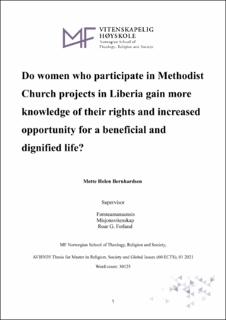Do women who participate in Methodist Church projects in Liberia gain more knowledge of their rights and increased opportunity for a beneficial and dignified life?
Abstract
I present an empirical research project of two local communities Gbechon and St. John, in rural Liberia, that have received assistance through the Norwegians Methodist Church's project Partnership in Development, CODEVPRO. It is a qualitative study, and I have chosen to use observation, semi-structured focus groups, and in-depth interviews to gain the best possible access to experiences from the projects' users, especially the women. My research shows that the Norwegian Church's projects profoundly impact the communities and particularly the women's lives. The women claim they have a better knowledge of their rights, better self-esteem, and more significant influence in the community. They also claim that they achieve more respect, are less exposed to violence, have increased their income, and gained more control of the household finances.
My aim of this thesis in religion, society, and global issues, is to examine if women who participate in the Methodist Church project in Liberia gain a better knowledge of their rights and if they get an increased opportunity for a beneficial and dignified life. I find this necessary because we need more research and more in-depth insight into how development money is used and whether the help we offer has a pleasing effect on the most vulnerable groups.
My inspiration for minimum requirements for a good and dignified life is Martha Nussbaum's theory, The capability approach. Do the women feel that their lives have been improved in any way after participation in the projects?
The Norwegian Methodist Church shows a deep commitment to their projects, and they support students to travel and visit their projects. All the choices and decisions made on this trip are my own, and I write the thesis with a feministic perspective where the main goal is to improve women's lives.
